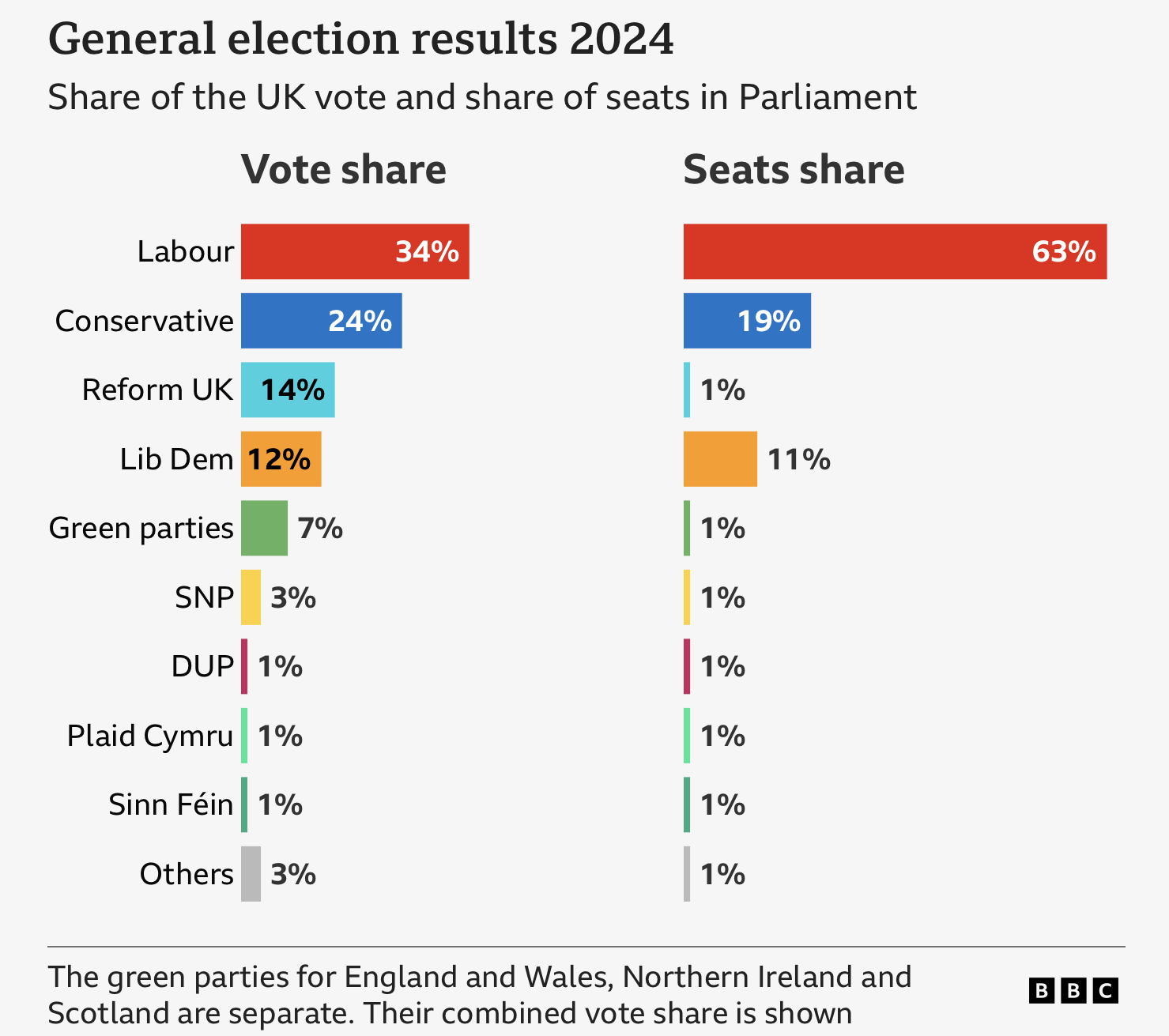What’s wrong with our government?
We believe there are 3 fundamental problems that we’d like to focus on.
Corruption, Disproportionate Representation, Inflexibility
Let's start with the obvious. Corruption.
We see evidence of this in every party. From ridiculous and frivolous expense claims, embezzlement, accepting bribes, cronyism, fraud and no shortage of affairs and sexual deviancy. The list seems endless.
Just take a look at this wikipedia list of scandals.
If you need any more evidence of corruption I’m sure the news will cover another scandal within the week.
If not, we’ll move on.
Disproportionate Representation
Also widely accepted as fact and clearly evident from the latest 2024 election.
According to the BBC Labour received 34% of the public vote and 63% of the seats in parliament. Meanwhile Reform got 14% of the vote but only 1% of the seats.
The ratio of seats to votes is clearly different, hence disproportionate.
We believe there are 2 reasons this discrepancy occurs.
First being the widely criticised ‘First past the post’ (FPTP) voting system.
For more information on voting practises we recommend taking a look at the electoral-reform.org.uk , They have been campaigning for improvements to voting practices since 1884.
(Goes to show how slow and inefficient our government is)
Just to quickly show you what FPTP does here’s a few stats.
Terry Jermy had the lowest winning percentage of votes.
So three quarters of his constituency didn’t want him, but he still won and is now serving in parliament.
The second reason for this discrepancy is also our third problem with the system itself, the Party System.
Having compiled all the results directly from members.parliament.uk
We have determined that of the 650 seats only 95 of them managed to exceed the 50% of votes required to be considered representative.
Leaving us with only 14.62% accurate representation.
Inflexibility
With relation to FPTP, the party system makes this already terrible voting practise worse. Simply put it seems to amplify the discrepancy.
We believe the Electoral Reform Society are correct in their analysis that a change in voting practices would vastly increase the accuracy of representation in parliament.
However even if we change the voting practise the result will still be -
One party winning a majority of seats.
A coalition of parties to create a majority.
A minority government.
In effect, while the representation may improve, the results don’t really change.
This leads us to the main reason we see the party system as problematic.
It’s tribal and dogmatic but most of all, inflexible.
A minority government will struggle to get anything done as it requires co-operation and compromise which will take debate and negotiation.
Once an agreement has been made it may well look nothing like what the public voted for, which rather undermines the point of voting.
A coalition and majority government may move relatively quicker as they do not require as much compromise or negotiation in order to implement policy.
The problem here is that the policies will be exclusively from a singleminded ideology, without compromise.
So why is that problematic if they won fair and square?
Here’s why we say our governments are inflexible.
Take the typical left to right political spectrum and approximate the location and range of the political parties.
Now lets list some of the ministerial departments.
As a voter we consider all the policies from all the parties, weigh up priorities and try to work out which party aligns closest with us.
So for each department place a pin on the spectrum.
The more of the departments and their policies you align within the same party the easier your choice becomes but most people will end up with a variety.
This is expressed simply as a bell curve along the spectrum.
Analogy
We want to design our dream house.
Imagine the parties as architects and the ideologies are their blueprints, their grand designs.
We might like the living room Labour have drawn up but want the garden from Greens design and the Conservative conservatory.
Well these architects are not willing to change their plans. Sorry.
Their design is sacred and cannot be changed, it is their dream house, not yours.
The PM (lead architect) employs some trusted zealots (The Cabinet) that share the vision and they get to work building their utopia, not yours!
These zealots are equally uncompromising and in some cases don’t actually know much about their part of the project but, rather than admit they don’t know what they’re doing, they pretend everything is fine and stick to the plan.
Years later we find out the plumbing is dodgy, electrics are a disaster waiting to happen and the brickwork is crumbling because they needed to cut corners because they’re way over budget although they kept the chandelier because it was integral to the vision.
That’s pretty much government.
Not what you really wanted in the first place, cost more than you thought and will cost you even more to fix the mess they left you with.
What this demonstrates is how little choice we really have.
How little control we really have.
How little democracy we truly have.
And how relentlessly inflexible the party system is.
All the varying issues from all areas of modern life condensed into 1 choice that is incredibly unlikely to align with all of your ideological preferences. Unlikely to be your dream home.
So what are we going to do about it?
We have some suggestions HERE






